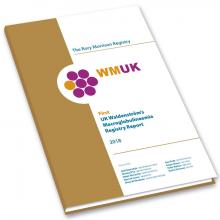Dendrite and WMUK Charity publish world’s first Waldenström’s Macroglobulinaemia Report
 Dendrite Clinical Systems and Waldenström’s Macroglobulinaemia United Kingdom Charity have published the First UK Waldenström’s Macroglobulinaemia Registry Report 2018 – the first report of its kind in the world.
Dendrite Clinical Systems and Waldenström’s Macroglobulinaemia United Kingdom Charity have published the First UK Waldenström’s Macroglobulinaemia Registry Report 2018 – the first report of its kind in the world.
Waldenström’s macroglobulinaemia (WM) is a rare form of low-grade non-Hodgkin’s lymphoma defined by so-called lymphoplasmacytic lymphoma in the bone marrow alongside an IgM monoclonal or paraprotein in most cases. WM has an annual incidence in the UK of approximately 350 new cases per year and an estimated prevalence to be around two to three thousand.
“The Rory Morrison Registry is a true collaborative effort between patients and clinicians. The report highlights some of the critical findings from the Registry but has barely scratched the surface of the Registry’s potential,” the report states. “With continued expansion, regular data entry and constant patient involvement and drive, the Registry will be an immense force that will drive the use of novel therapies in the United Kingdom, improve and standardise care, and contribute to the global research effort in understanding a complex condition.”
In order to capture the UK picture of WM and its diverse complications, disease characteristics, prescribing habits and clinical outcomes, an online registry was developed by Dendrite using generous funds raised by donations to the WMUK Charity. The subsequent ‘Rory Morrison Registry’ was named after Rory Morrison, the former BBC presenter and WM patient.
Utilising Dendrite’s “Intellect Web” software, physicians were able to enter patient data online. using a range of modern html-5 compatible web browsers, without the need to install additional software or perform any complex system configurations.
“The intricacies of Waldenström’s macroglobulinaemia have meant that our Registry has needed sequential optimisation steps to meet our requirements. We have been delighted with the service that we have received to enable us to achieve this, both in terms of adding or removing fields, adjusting the layout so that it is ergonomic to use,” said Dr Lynn Quek Consultant Haematologist Oxford University Hospitals & Weatherall Institute of Molecular Science Oxford. “From the conception of the project to the initial building of the database, its evolution into a resource that is fit for purpose as well as its maintenance, the professionalism and timely support of Dendrite has been exceptional and made our project possible.”



